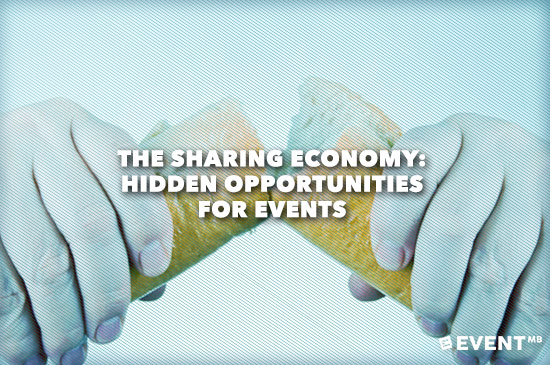The Sharing Economy: Hidden Opportunities for Events

There is some debate about how to define the Sharing Economy. To some, it describes the peer-to-peer sharing or buying of goods and services. To others, it is the term for earning money on underutilized assets. By either definition, there are very good reasons for the event industry to pay attention to this growing movement. The temporary, transient nature of events is perfect for sharing and there are opportunities to be leveraged.
Why Pay Attention?
Sharing is already having an impact on the economy. Jeremiah Owyang, a thought leader on sharing and collaboration, says there are currently 17 billion-dollar companies with 60,000 employees and $15 billion in funding in the Sharing or Collaborative Economy. PricewaterhouseCoopers estimates that sharing will bring in $335 billion over the next decade.
The Sharing Economy is influencing the event industry too. Although meeting planners are reluctant to compromise existing relationships they have with hotel chains and other vendors, meeting attendees are sending a clear message that for many sharing-type accommodations, services, and goods are of interest and, in some cases, preferred - primarily due to lower costs.
A study by researchers from Boston University found that airbnb rentals in Austin Texas (home of the massive SXSW Festival) reduced hotel revenues between 8-10%. Hyatt has invested in home-sharing service onefinestay to test the waters of alternative lodging. airbnb has rolled out a service for business travelers and travel managers (airbnbbusiness) and Uber EVENTS is helping planners pay for their guests’ rides.
Where and How to Share
While a few Sharing-Economy apps have already come and gone in the event industry, there is still tremendous interest. A number of newcomers in the venue search and staffing categories are listed in EventMB’s “10 Event Trends for 2016” ebook. With so much activity and large companies from outside the event industry moving in, planners, suppliers, and would-be platform developers need to expand their thinking around sharing and stay focused on the value it delivers.
In her EventMB blog post, Shawna McKinley posts there are at least three ways the event industry can respond to sharing. For those interested in joining in, plenty of opportunities remain hidden in the untapped reserves of the meeting ecosystem:
Education
A number of video platforms designed to deliver on-demand conference content already exist. There are also online universities and pay-per-view educational websites for planners. But, there is a huge opportunity for a company to deliver “how-to” training and education from professionals to professionals in the style of Khan Academy or Lynda.com.
Tasks
Being an event planner or an attendee in an unfamiliar city can be a challenge. A number of sharing services “rent” people for small tasks from picking up the dry cleaning to shopping. Trade show and conference organizers could cash in on the demand for micro-help during events by partnering with an existing small-jobs marketplace to provide planners and attendees with concierge-style help.
Space Rental
Many suppliers of products and services for the event industry have offices in the major cities. What better way to bring yourself closer to the community you serve than to rent out underutilized space—office space, meeting rooms, dining areas, or warehouse facilities—to exhibitors for pre- and post-event meetings or product assembly?
Local goods
Many visitors to events buy souvenirs and local products to bring back home. Out of convenience, they flock to shopping malls, hotel gift shops, even airport stores. Meeting organizers can help local artisans and give back to the community by tapping into existing platforms for locally made products or creating space within their events for a marketplace or pop-up store for local makers.
Contractors
A growing number of individuals are opting out of the nine-to-five job scene and entering the “gig” economy. While few event-industry jobs are limited to eight hours a day, there are plenty of professionals moonlighting and freelancing. Those with specific expertise in the event industry are in high demand, from content creators and social media assistants to floor managers and technology consultants. Access to these individuals can help planners deliver more for less.
More Reasons to Share
The projected size of the Sharing Economy and the entrance of big-name brands into the event space is reason enough for event planners and suppliers to broaden their thinking around sharing, but there’s even more to it than that. Millennials with the greatest appetite for sharing are entering the workforce rapidly and lowering the costs for them to participate in events can drive registration and in-event purchases. Plus, investing in the local community is a coveted sustainability practice.
In Conclusion
Event organizers and suppliers can’t afford to ignore the Sharing Economy. The smart companies will look for more ways to leverage sharing including partnering with existing players or looking within their own communities for opportunities to compete on price, convenience and brand—the top reasons why consumers choose to rent rather than buy. But, there’s something else. The Sharing Economy is also the experience economy and there are no better experts in experience than event professionals.




